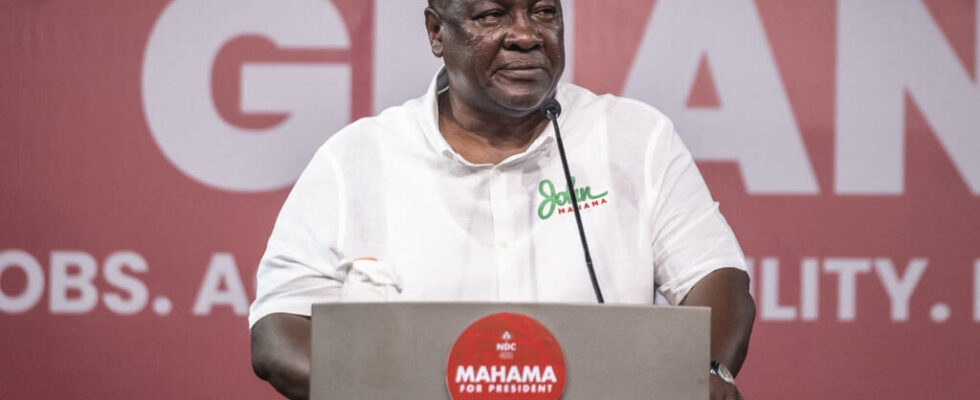The Ghanaian Electoral Commission confirmed, this Monday, December 9, the victory of John Dramani Mahama in the presidential election with 56.55% of the votes, according to provisional results. His opponent, Mahamudu Bawumia is credited with 41.01% of the votes. The vice-president of Ghana and candidate of the ruling party for the presidency, Mahamudu Bawumia, had already admitted his defeat on Sunday, December 8.
3 mins
With our correspondent in Accra, Victor Cariou
This is a very big victory for John Dramani Mahama. The former president and candidate of the National Democratic Congress returns to power with 6 million and 328,000 votes, or more than 56% of the votes cast. This is five points more than what Nana Akufo Addo obtained during his victory in 2020.
The outgoing vice-president and candidate of the New Patriotic Party, Mahamudu Bawumia, collected 4.6 million votes, or a little more than 41% of the vote, confirming, in fact, his defeat which he had -even announced the day before. The other 3% are distributed among the ten other candidates.
The other important figure is of course that of participation and, for this ninth election of the Fourth Republic, it is exceptionally low: 60.9%. This is almost 20% less than during the 2020 election, specified the commission which revealed these almost complete results. In nine constituencies, it was impossible to collect the results because, according to the president of the Electoral Commission, the compilation centers were “ besieged by political party activists », ballots certainly missing, but too few to be able to change anything in the result.
Renewed ambitions
Thus, with this official declaration, the president-elect of the GhanaJohn Dramani Mahama marks his comeback at the head of the country. The one who was beaten in 2016 by Nana Akufo Addo signs his revenge after eight years in opposition.
For this return, he displays renewed ambitions. The eldest son of a wealthy rice producer in northern Ghana, John Dramani Mahama rose to the top of the state without belonging to the high ruling elite. Vice-president, from 2009, he was propelled to the head of the country in 2012, after the sudden death of John Atta Mills, but he struggled to emerge from the shadow of his predecessor.
His first term, marked by chronic power cuts – nicknamed “Dumsor” (“turn on and off”, in local language) – was criticized for hasty agreements with foreign companies. It has often been described as ” poorly advised » by an entourage suspected of corruption. After eight years in opposition, he returns more seasoned. “ He is no longer a political novice », affirms analyst Kobi Annan.
For this return, he promises to industrialize Ghana, establish a 24-hour work system – a divisive idea – and invest $10 billion in infrastructure.
Appreciated for his calm and charisma, John Mahama today embodies the hope of more stable governance after years of economic crisis. Returning to the presidency, he only has one term to prove that he is truly the ” nation builder ”, as he likes to define himself.
Ghana’s new president promises to revive the economy, hard hit by one of the worst crises in its history
By Claire Fages
John Mahama promises a “reset” of the economy of Ghana, the leading African producer of gold mined by illegal gold panning and the world’s second largest producer of cocoa, whose income is insufficient to support farmers. To do this, the new elected president proposes to deregulate the labor market and introduce 3/8 to create nine times more jobs, in the private and public sectors.
Already at the head of the country from 2012 to 2017, John Mahama is committed to investing again in infrastructure, while removing taxes and establishing a debt ceiling, objectives which seem contradictory to establish the applicable budget from of March and that the outgoing team failed to complete because Ghana is barely getting its head above water.
Inflation is no longer 54% as in December 2022, when the country defaulted on its debt and was forced to request help from the IMF, which the new president also announced he wanted to renegotiate. But prices continue to increase by an average of 23% since the start of the year, which has thrown many Ghanaians into poverty for three years((, with a currency, the Cedi, which has lost 70% of its value.
Also readGhana: John Mahama wins presidential election, ruling party candidate admits defeat
